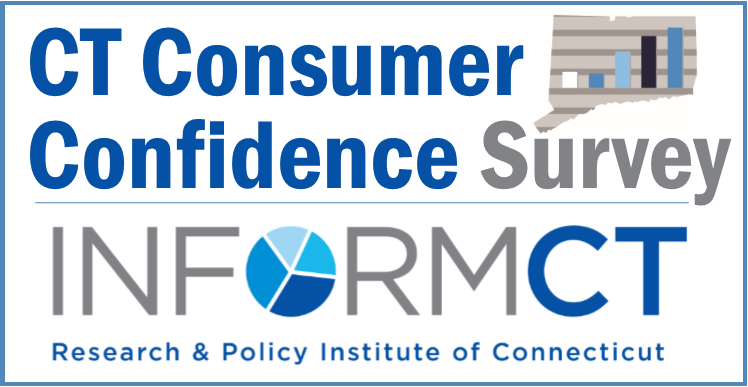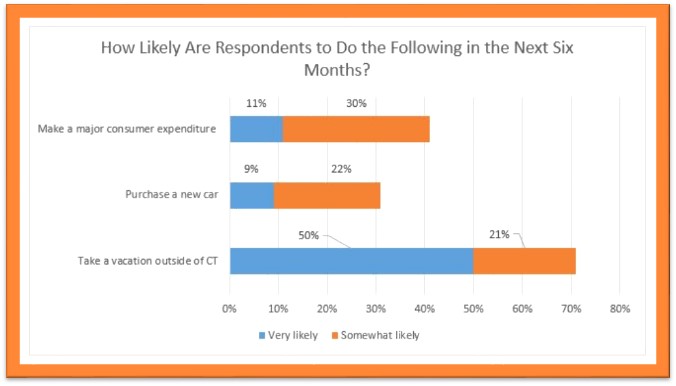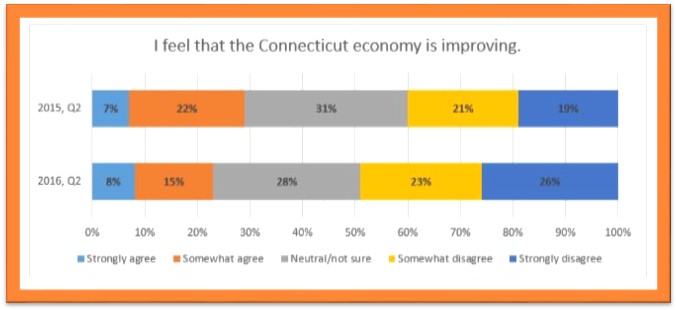CT Residents Concerns About Health Care Affordability, Job Prospects Increase; More Expect to Leave, Even as Optimism Grows
/Nearly two-thirds of Connecticut residents are concerned about the affordability of health insurance, a jump of 12 percentage points in just the past year, and the highest level since the quarterly Inform CT Consumer Confidence Survey began 18 months ago. And slightly more than 4 in 10 Connecticut residents now say it is likely that they will move out of the state within the next five years, reflecting concerns about a lack of jobs, declining business conditions and health insurance costs.
Yet, many residents continue to say that Connecticut is a good place to live and raise a family, and some optimism is evident in consumer spending expectations. The survey found that:
- 41% say it is likely they will make a major consumer expenditure (for furniture or other products) during the next six months.
- 31% say it is likely they will purchase a car in the next six months.
- 71% indicated they expected to take a vacation outside of Connecticut in the next six months.
All are the highest percentages since the quarterly survey began in 2015.
The quarterly survey is released by InformCT, a public-private partnership that provides independent, non-partisan research, analysis, and public outreach to help create fact-based dialogue and action in Connecticut. Administered by researchers from the Connecticut Economic Resource Center, Inc. (CERC) and Smith & Company, the analysis is based on the responses of residents across Connecticut and addresses key economic issues, providing a glimpse of the public’s views.
Despite qualms about the state’s economy, residents are increasingly optimistic about their own financial circumstances. One-third (32%) say they are better off now than six months ago, and 42 percent believe they will be better off six months from now than they are today. Both numbers are 5 percentage points higher than they were a year ago. The overall view of the state’s fiscal picture differs:
- A year ago, 40 percent of those surveyed disagreed with the statement that the Connecticut economy is improving. That percentage has now climbed – one year later – to 49 percent, nearly half the state.
- The percentage who believe that the state’s economy is improving has dropped from 29% a year ago to 23% during the second quarter of this year.
- Residents of New London and Fairfield County most strongly believed that business conditions had improved over the previous six months, with Middlesex, Windham and Litchfield more likely to say that business conditions had worsened.
 Increasingly, residents believe that jobs are “very hard to get” in Connecticut compared with six months ago (from about one-quarter to one-third of those surveyed in Q2 2016 versus Q2 2015), and are, in growing numbers, saying they would rather leave than stay.
Increasingly, residents believe that jobs are “very hard to get” in Connecticut compared with six months ago (from about one-quarter to one-third of those surveyed in Q2 2016 versus Q2 2015), and are, in growing numbers, saying they would rather leave than stay.
- A year ago, 32 percent of those surveyed said it was very likely or somewhat likely that they would move out of Connecticut within the next five years.
- A year later, that percentage has climbed by 10 points to 42 percent.
At the same time, about half of those surveyed say that “Connecticut is a good place to live and raise a family” – a number that has remained consistent for the past year and a half. Only 1 in 4 disagree. More than half of 18-21 year-olds and 22-25 year olds say they are likely to leave in the next five years; in all other age categories it is less than half, with those age 56-65 the least likely.
Concerns about having “enough money to retire comfortably” have remained steady for six consecutive quarters, with about less than 1 in 4 expressing the opinion that they anticipate having sufficient funds. And 1 in 4 now say it is likely that they will refinance their home or purchase a new home in the next six months, the highest percentage since the quarterly survey began.
With increasing calls for regional support of Hartford and regional approaches to tackling budget challenges, the survey found that an increasing number of residents in Connecticut believe that a range of services “could be effectively delivered regionally.”
 Forty-three percent, an increase from 40 percent in the year’s first quarter, answered “all of the above” when asked if education, libraries, public health, public safety and animal control could be provided regionally. Among those services individually, there was slightly greater support for a regional approach to public safety, slightly less for each of the others. The largest increase was for “all” of the services.
Forty-three percent, an increase from 40 percent in the year’s first quarter, answered “all of the above” when asked if education, libraries, public health, public safety and animal control could be provided regionally. Among those services individually, there was slightly greater support for a regional approach to public safety, slightly less for each of the others. The largest increase was for “all” of the services.
The question of what residents in the region consider to be the “best way to grow the economy” saw a preference for investing in schools and community features over recruiting companies, by an increasing margin. In this year’s first quarter, the margin was 52% to 48%. In the most recent quarter that margin had grown by 9 percentage points to 61%-39%, from just over half to more than 6 in 10.






























